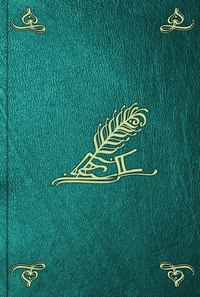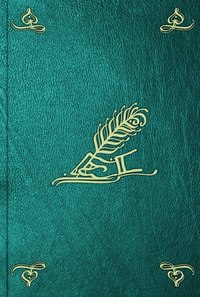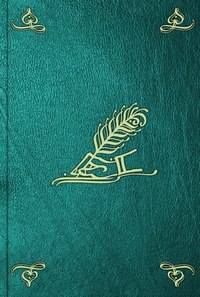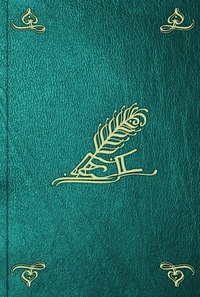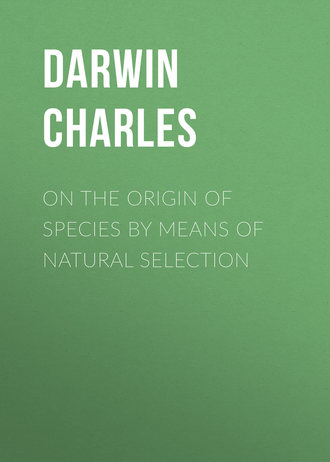 полная версия
полная версияOn the Origin of Species By Means of Natural Selection
That climate acts in main part indirectly by favouring other species, we may clearly see in the prodigious number of plants in our gardens which can perfectly well endure our climate, but which never become naturalised, for they cannot compete with our native plants, nor resist destruction by our native animals.
When a species, owing to highly favourable circumstances, increases inordinately in numbers in a small tract, epidemics – at least, this seems generally to occur with our game animals – often ensue: and here we have a limiting check independent of the struggle for life. But even some of these so-called epidemics appear to be due to parasitic worms, which have from some cause, possibly in part through facility of diffusion amongst the crowded animals, been disproportionably favoured: and here comes in a sort of struggle between the parasite and its prey.
On the other hand, in many cases, a large stock of individuals of the same species, relatively to the numbers of its enemies, is absolutely necessary for its preservation. Thus we can easily raise plenty of corn and rape-seed, etc., in our fields, because the seeds are in great excess compared with the number of birds which feed on them; nor can the birds, though having a superabundance of food at this one season, increase in number proportionally to the supply of seed, as their numbers are checked during winter: but any one who has tried, knows how troublesome it is to get seed from a few wheat or other such plants in a garden; I have in this case lost every single seed. This view of the necessity of a large stock of the same species for its preservation, explains, I believe, some singular facts in nature, such as that of very rare plants being sometimes extremely abundant in the few spots where they do occur; and that of some social plants being social, that is, abounding in individuals, even on the extreme confines of their range. For in such cases, we may believe, that a plant could exist only where the conditions of its life were so favourable that many could exist together, and thus save each other from utter destruction. I should add that the good effects of frequent intercrossing, and the ill effects of close interbreeding, probably come into play in some of these cases; but on this intricate subject I will not here enlarge.
Many cases are on record showing how complex and unexpected are the checks and relations between organic beings, which have to struggle together in the same country. I will give only a single instance, which, though a simple one, has interested me. In Staffordshire, on the estate of a relation where I had ample means of investigation, there was a large and extremely barren heath, which had never been touched by the hand of man; but several hundred acres of exactly the same nature had been enclosed twenty-five years previously and planted with Scotch fir. The change in the native vegetation of the planted part of the heath was most remarkable, more than is generally seen in passing from one quite different soil to another: not only the proportional numbers of the heath-plants were wholly changed, but twelve species of plants (not counting grasses and carices) flourished in the plantations, which could not be found on the heath. The effect on the insects must have been still greater, for six insectivorous birds were very common in the plantations, which were not to be seen on the heath; and the heath was frequented by two or three distinct insectivorous birds. Here we see how potent has been the effect of the introduction of a single tree, nothing whatever else having been done, with the exception that the land had been enclosed, so that cattle could not enter. But how important an element enclosure is, I plainly saw near Farnham, in Surrey. Here there are extensive heaths, with a few clumps of old Scotch firs on the distant hill-tops: within the last ten years large spaces have been enclosed, and self-sown firs are now springing up in multitudes, so close together that all cannot live.
When I ascertained that these young trees had not been sown or planted, I was so much surprised at their numbers that I went to several points of view, whence I could examine hundreds of acres of the unenclosed heath, and literally I could not see a single Scotch fir, except the old planted clumps. But on looking closely between the stems of the heath, I found a multitude of seedlings and little trees, which had been perpetually browsed down by the cattle. In one square yard, at a point some hundred yards distant from one of the old clumps, I counted thirty-two little trees; and one of them, judging from the rings of growth, had during twenty-six years tried to raise its head above the stems of the heath, and had failed. No wonder that, as soon as the land was enclosed, it became thickly clothed with vigorously growing young firs. Yet the heath was so extremely barren and so extensive that no one would ever have imagined that cattle would have so closely and effectually searched it for food.
Here we see that cattle absolutely determine the existence of the Scotch fir; but in several parts of the world insects determine the existence of cattle. Perhaps Paraguay offers the most curious instance of this; for here neither cattle nor horses nor dogs have ever run wild, though they swarm southward and northward in a feral state; and Azara and Rengger have shown that this is caused by the greater number in Paraguay of a certain fly, which lays its eggs in the navels of these animals when first born. The increase of these flies, numerous as they are, must be habitually checked by some means, probably by birds. Hence, if certain insectivorous birds (whose numbers are probably regulated by hawks or beasts of prey) were to increase in Paraguay, the flies would decrease – then cattle and horses would become feral, and this would certainly greatly alter (as indeed I have observed in parts of South America) the vegetation: this again would largely affect the insects; and this, as we just have seen in Staffordshire, the insectivorous birds, and so onwards in ever-increasing circles of complexity. We began this series by insectivorous birds, and we have ended with them. Not that in nature the relations can ever be as simple as this. Battle within battle must ever be recurring with varying success; and yet in the long-run the forces are so nicely balanced, that the face of nature remains uniform for long periods of time, though assuredly the merest trifle would often give the victory to one organic being over another. Nevertheless so profound is our ignorance, and so high our presumption, that we marvel when we hear of the extinction of an organic being; and as we do not see the cause, we invoke cataclysms to desolate the world, or invent laws on the duration of the forms of life!
I am tempted to give one more instance showing how plants and animals, most remote in the scale of nature, are bound together by a web of complex relations. I shall hereafter have occasion to show that the exotic Lobelia fulgens, in this part of England, is never visited by insects, and consequently, from its peculiar structure, never can set a seed. Many of our orchidaceous plants absolutely require the visits of moths to remove their pollen-masses and thus to fertilise them. I have, also, reason to believe that humble-bees are indispensable to the fertilisation of the heartsease (Viola tricolor), for other bees do not visit this flower. From experiments which I have tried, I have found that the visits of bees, if not indispensable, are at least highly beneficial to the fertilisation of our clovers; but humble-bees alone visit the common red clover (Trifolium pratense), as other bees cannot reach the nectar. Hence I have very little doubt, that if the whole genus of humble-bees became extinct or very rare in England, the heartsease and red clover would become very rare, or wholly disappear. The number of humble-bees in any district depends in a great degree on the number of field-mice, which destroy their combs and nests; and Mr. H. Newman, who has long attended to the habits of humble-bees, believes that "more than two thirds of them are thus destroyed all over England." Now the number of mice is largely dependent, as every one knows, on the number of cats; and Mr. Newman says, "Near villages and small towns I have found the nests of humble-bees more numerous than elsewhere, which I attribute to the number of cats that destroy the mice." Hence it is quite credible that the presence of a feline animal in large numbers in a district might determine, through the intervention first of mice and then of bees, the frequency of certain flowers in that district!
In the case of every species, many different checks, acting at different periods of life, and during different seasons or years, probably come into play; some one check or some few being generally the most potent, but all concurring in determining the average number or even the existence of the species. In some cases it can be shown that widely-different checks act on the same species in different districts. When we look at the plants and bushes clothing an entangled bank, we are tempted to attribute their proportional numbers and kinds to what we call chance. But how false a view is this! Every one has heard that when an American forest is cut down, a very different vegetation springs up; but it has been observed that the trees now growing on the ancient Indian mounds, in the Southern United States, display the same beautiful diversity and proportion of kinds as in the surrounding virgin forests. What a struggle between the several kinds of trees must here have gone on during long centuries, each annually scattering its seeds by the thousand; what war between insect and insect – between insects, snails, and other animals with birds and beasts of prey – all striving to increase, and all feeding on each other or on the trees or their seeds and seedlings, or on the other plants which first clothed the ground and thus checked the growth of the trees! Throw up a handful of feathers, and all must fall to the ground according to definite laws; but how simple is this problem compared to the action and reaction of the innumerable plants and animals which have determined, in the course of centuries, the proportional numbers and kinds of trees now growing on the old Indian ruins!
The dependency of one organic being on another, as of a parasite on its prey, lies generally between beings remote in the scale of nature. This is often the case with those which may strictly be said to struggle with each other for existence, as in the case of locusts and grass-feeding quadrupeds. But the struggle almost invariably will be most severe between the individuals of the same species, for they frequent the same districts, require the same food, and are exposed to the same dangers. In the case of varieties of the same species, the struggle will generally be almost equally severe, and we sometimes see the contest soon decided: for instance, if several varieties of wheat be sown together, and the mixed seed be resown, some of the varieties which best suit the soil or climate, or are naturally the most fertile, will beat the others and so yield more seed, and will consequently in a few years quite supplant the other varieties. To keep up a mixed stock of even such extremely close varieties as the variously coloured sweet-peas, they must be each year harvested separately, and the seed then mixed in due proportion, otherwise the weaker kinds will steadily decrease in numbers and disappear. So again with the varieties of sheep: it has been asserted that certain mountain-varieties will starve out other mountain-varieties, so that they cannot be kept together. The same result has followed from keeping together different varieties of the medicinal leech. It may even be doubted whether the varieties of any one of our domestic plants or animals have so exactly the same strength, habits, and constitution, that the original proportions of a mixed stock could be kept up for half a dozen generations, if they were allowed to struggle together, like beings in a state of nature, and if the seed or young were not annually sorted.
As species of the same genus have usually, though by no means invariably, some similarity in habits and constitution, and always in structure, the struggle will generally be more severe between species of the same genus, when they come into competition with each other, than between species of distinct genera. We see this in the recent extension over parts of the United States of one species of swallow having caused the decrease of another species. The recent increase of the missel-thrush in parts of Scotland has caused the decrease of the song-thrush. How frequently we hear of one species of rat taking the place of another species under the most different climates! In Russia the small Asiatic cockroach has everywhere driven before it its great congener. One species of charlock will supplant another, and so in other cases. We can dimly see why the competition should be most severe between allied forms, which fill nearly the same place in the economy of nature; but probably in no one case could we precisely say why one species has been victorious over another in the great battle of life.
A corollary of the highest importance may be deduced from the foregoing remarks, namely, that the structure of every organic being is related, in the most essential yet often hidden manner, to that of all other organic beings, with which it comes into competition for food or residence, or from which it has to escape, or on which it preys. This is obvious in the structure of the teeth and talons of the tiger; and in that of the legs and claws of the parasite which clings to the hair on the tiger's body. But in the beautifully plumed seed of the dandelion, and in the flattened and fringed legs of the water-beetle, the relation seems at first confined to the elements of air and water. Yet the advantage of plumed seeds no doubt stands in the closest relation to the land being already thickly clothed by other plants; so that the seeds may be widely distributed and fall on unoccupied ground. In the water-beetle, the structure of its legs, so well adapted for diving, allows it to compete with other aquatic insects, to hunt for its own prey, and to escape serving as prey to other animals.
The store of nutriment laid up within the seeds of many plants seems at first sight to have no sort of relation to other plants. But from the strong growth of young plants produced from such seeds (as peas and beans), when sown in the midst of long grass, I suspect that the chief use of the nutriment in the seed is to favour the growth of the young seedling, whilst struggling with other plants growing vigorously all around.
Look at a plant in the midst of its range, why does it not double or quadruple its numbers? We know that it can perfectly well withstand a little more heat or cold, dampness or dryness, for elsewhere it ranges into slightly hotter or colder, damper or drier districts. In this case we can clearly see that if we wished in imagination to give the plant the power of increasing in number, we should have to give it some advantage over its competitors, or over the animals which preyed on it. On the confines of its geographical range, a change of constitution with respect to climate would clearly be an advantage to our plant; but we have reason to believe that only a few plants or animals range so far, that they are destroyed by the rigour of the climate alone. Not until we reach the extreme confines of life, in the arctic regions or on the borders of an utter desert, will competition cease. The land may be extremely cold or dry, yet there will be competition between some few species, or between the individuals of the same species, for the warmest or dampest spots.
Hence, also, we can see that when a plant or animal is placed in a new country amongst new competitors, though the climate may be exactly the same as in its former home, yet the conditions of its life will generally be changed in an essential manner. If we wished to increase its average numbers in its new home, we should have to modify it in a different way to what we should have done in its native country; for we should have to give it some advantage over a different set of competitors or enemies.
It is good thus to try in our imagination to give any form some advantage over another. Probably in no single instance should we know what to do, so as to succeed. It will convince us of our ignorance on the mutual relations of all organic beings; a conviction as necessary, as it seems to be difficult to acquire. All that we can do, is to keep steadily in mind that each organic being is striving to increase at a geometrical ratio; that each at some period of its life, during some season of the year, during each generation or at intervals, has to struggle for life, and to suffer great destruction. When we reflect on this struggle, we may console ourselves with the full belief, that the war of nature is not incessant, that no fear is felt, that death is generally prompt, and that the vigorous, the healthy, and the happy survive and multiply.
4. NATURAL SELECTION
Natural Selection: its power compared with man's selection, its power on characters of trifling importance, its power at all ages and on both sexes. Sexual Selection. On the generality of intercrosses between individuals of the same species. Circumstances favourable and unfavourable to Natural Selection, namely, intercrossing, isolation, number of individuals. Slow action. Extinction caused by Natural Selection. Divergence of Character, related to the diversity of inhabitants of any small area, and to naturalisation. Action of Natural Selection, through Divergence of Character and Extinction, on the descendants from a common parent. Explains the Grouping of all organic beings.
How will the struggle for existence, discussed too briefly in the last chapter, act in regard to variation? Can the principle of selection, which we have seen is so potent in the hands of man, apply in nature? I think we shall see that it can act most effectually. Let it be borne in mind in what an endless number of strange peculiarities our domestic productions, and, in a lesser degree, those under nature, vary; and how strong the hereditary tendency is. Under domestication, it may be truly said that the whole organisation becomes in some degree plastic. Let it be borne in mind how infinitely complex and close-fitting are the mutual relations of all organic beings to each other and to their physical conditions of life. Can it, then, be thought improbable, seeing that variations useful to man have undoubtedly occurred, that other variations useful in some way to each being in the great and complex battle of life, should sometimes occur in the course of thousands of generations? If such do occur, can we doubt (remembering that many more individuals are born than can possibly survive) that individuals having any advantage, however slight, over others, would have the best chance of surviving and of procreating their kind? On the other hand, we may feel sure that any variation in the least degree injurious would be rigidly destroyed. This preservation of favourable variations and the rejection of injurious variations, I call Natural Selection. Variations neither useful nor injurious would not be affected by natural selection, and would be left a fluctuating element, as perhaps we see in the species called polymorphic.
We shall best understand the probable course of natural selection by taking the case of a country undergoing some physical change, for instance, of climate. The proportional numbers of its inhabitants would almost immediately undergo a change, and some species might become extinct. We may conclude, from what we have seen of the intimate and complex manner in which the inhabitants of each country are bound together, that any change in the numerical proportions of some of the inhabitants, independently of the change of climate itself, would most seriously affect many of the others. If the country were open on its borders, new forms would certainly immigrate, and this also would seriously disturb the relations of some of the former inhabitants. Let it be remembered how powerful the influence of a single introduced tree or mammal has been shown to be. But in the case of an island, or of a country partly surrounded by barriers, into which new and better adapted forms could not freely enter, we should then have places in the economy of nature which would assuredly be better filled up, if some of the original inhabitants were in some manner modified; for, had the area been open to immigration, these same places would have been seized on by intruders. In such case, every slight modification, which in the course of ages chanced to arise, and which in any way favoured the individuals of any of the species, by better adapting them to their altered conditions, would tend to be preserved; and natural selection would thus have free scope for the work of improvement.
We have reason to believe, as stated in the first chapter, that a change in the conditions of life, by specially acting on the reproductive system, causes or increases variability; and in the foregoing case the conditions of life are supposed to have undergone a change, and this would manifestly be favourable to natural selection, by giving a better chance of profitable variations occurring; and unless profitable variations do occur, natural selection can do nothing. Not that, as I believe, any extreme amount of variability is necessary; as man can certainly produce great results by adding up in any given direction mere individual differences, so could Nature, but far more easily, from having incomparably longer time at her disposal. Nor do I believe that any great physical change, as of climate, or any unusual degree of isolation to check immigration, is actually necessary to produce new and unoccupied places for natural selection to fill up by modifying and improving some of the varying inhabitants. For as all the inhabitants of each country are struggling together with nicely balanced forces, extremely slight modifications in the structure or habits of one inhabitant would often give it an advantage over others; and still further modifications of the same kind would often still further increase the advantage. No country can be named in which all the native inhabitants are now so perfectly adapted to each other and to the physical conditions under which they live, that none of them could anyhow be improved; for in all countries, the natives have been so far conquered by naturalised productions, that they have allowed foreigners to take firm possession of the land. And as foreigners have thus everywhere beaten some of the natives, we may safely conclude that the natives might have been modified with advantage, so as to have better resisted such intruders.
As man can produce and certainly has produced a great result by his methodical and unconscious means of selection, what may not nature effect? Man can act only on external and visible characters: nature cares nothing for appearances, except in so far as they may be useful to any being. She can act on every internal organ, on every shade of constitutional difference, on the whole machinery of life. Man selects only for his own good; Nature only for that of the being which she tends. Every selected character is fully exercised by her; and the being is placed under well-suited conditions of life. Man keeps the natives of many climates in the same country; he seldom exercises each selected character in some peculiar and fitting manner; he feeds a long and a short beaked pigeon on the same food; he does not exercise a long-backed or long-legged quadruped in any peculiar manner; he exposes sheep with long and short wool to the same climate. He does not allow the most vigorous males to struggle for the females. He does not rigidly destroy all inferior animals, but protects during each varying season, as far as lies in his power, all his productions. He often begins his selection by some half-monstrous form; or at least by some modification prominent enough to catch his eye, or to be plainly useful to him. Under nature, the slightest difference of structure or constitution may well turn the nicely-balanced scale in the struggle for life, and so be preserved. How fleeting are the wishes and efforts of man! how short his time! and consequently how poor will his products be, compared with those accumulated by nature during whole geological periods. Can we wonder, then, that nature's productions should be far "truer" in character than man's productions; that they should be infinitely better adapted to the most complex conditions of life, and should plainly bear the stamp of far higher workmanship?


